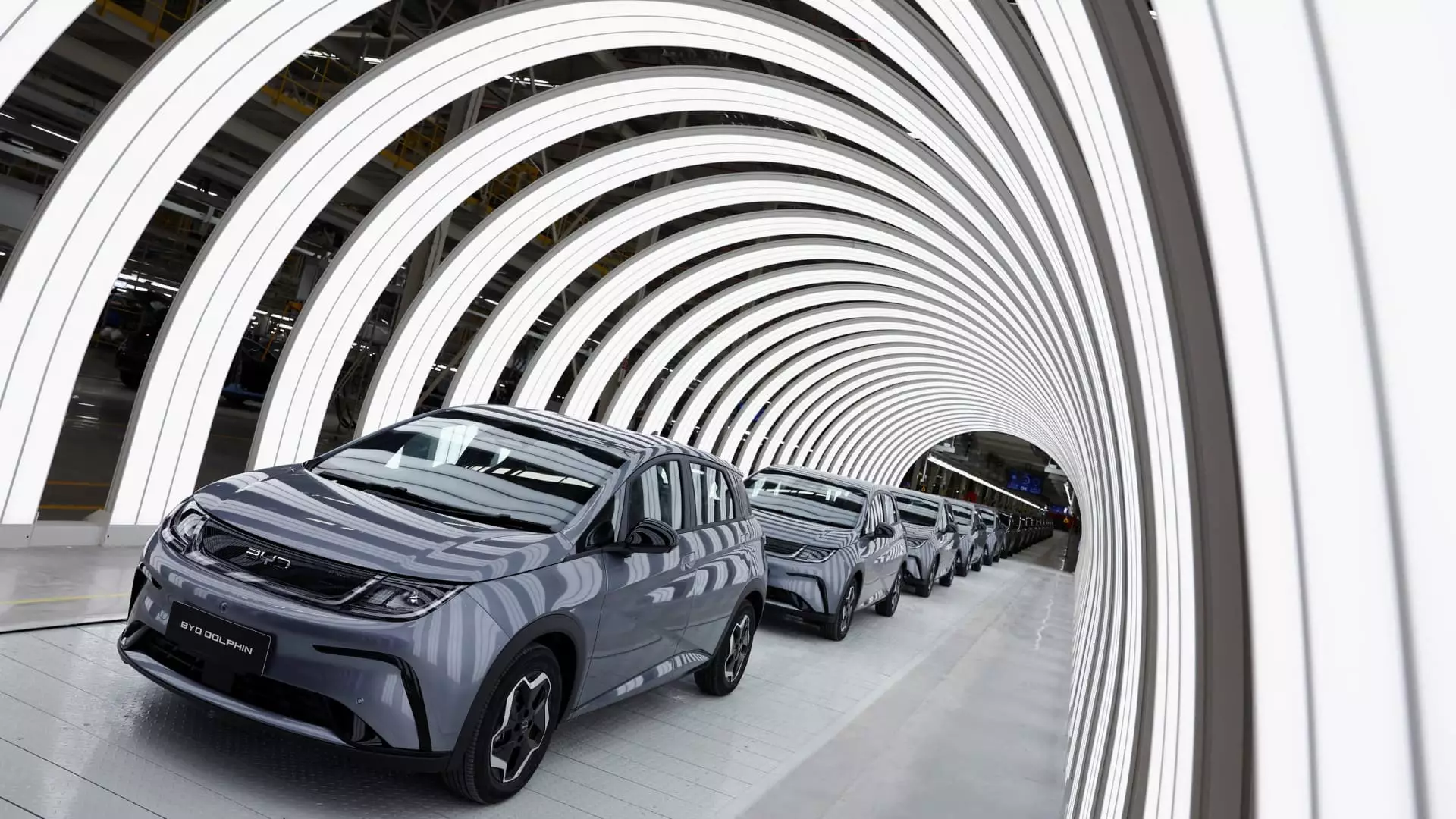The electric vehicle (EV) landscape is rapidly evolving, with an increasing number of automakers integrating advanced technology into their vehicles to meet consumer demands for safety and convenience. One shining example is BYD, China’s leading electric car manufacturer, which has recently made significant strides in the development of its driver-assistance systems. The implications of BYD’s advancements resonate beyond its operations; they highlight a potential boon for its suppliers and the broader auto industry, particularly in a landscape marked by heightened competition and technological acceleration.
In recent trading sessions, BYD’s stock experienced a remarkable surge, reaching an all-time high following the company’s announcement of new driver-assistance capabilities in a range of its vehicles, including affordably priced models. The introduction of these systems not only enhances the competitiveness of BYD vehicles in the saturated Chinese electric car market but also emphasizes the growing consumer preference for vehicles equipped with safety and automated features. The pricing strategies, such as offering models below 70,000 yuan (approximately $9,600), demonstrate BYD’s commitment to accessibility combined with innovation.
The integration of cutting-edge technology, particularly in the form of artificial intelligence from DeepSeek, emphasizes BYD’s forward-thinking approach. Analysts have noted that the implementation of these systems could set a precedent for competitors, leading to an industry-wide push for similar technological enhancements. With more manufacturers seeking to catch up, suppliers involved in the production of smart driving components stand to see considerable growth in demand.
Analysts from Nomura have expressed optimistic forecasts for BYD’s supply chain, predicting robust growth prospects for the companies that provide the necessary components for the driver-assistance systems. Key players such as BYD Electronics, Horizon Robotics, and Hesai Technology are among those positioned to benefit significantly. Horizon Robotics, in particular, has been cited as a critical chip supplier for BYD, and recent upgrades from market analysts indicate confidence in the performance of its new Journey 6 chipset series.
The Journey 6 series is projected to become a cornerstone of Horizon Robotics’ revenue, expanding from a mere 3% of total income to an impressive 40% by 2027. Such growth potential reflects broader trends in the auto industry as manufacturers increasingly prioritize smart driving technologies in their vehicle offerings. Moreover, the recent climbing of Horizon Robotics’ stock price serves as a testament to investor confidence in its role as a leader in smart driving solutions.
BYD’s ambitious rollout of its driver-assist technologies inevitably raises the stakes for other automotive manufacturers, specifically in China, where competition is fierce. Industry competition is not only defined by price but heavily influenced by technological advancements; the incorporation of driver-assistance systems is quickly becoming a crucial differentiator for brands.
The response from other manufacturers, such as Tesla, exemplifies this competitive urgency. With Tesla facing challenges in getting its Full Self-Driving software approved in China, its stock fell in conjunction with BYD’s driver-assist announcements. This highlights the delicate balance car manufacturers must maintain as they juggle technological innovation, regulatory requirements, and investor expectations in an ever-competitive market.
As part of BYD’s advanced driver-assistance features, lidar technology plays a pivotal role. Unlike conventional sensors, lidar utilizes laser light to create 3D maps of a vehicle’s surroundings, providing enhanced situational awareness. Companies like Hesai Tech, which specialize in lidar technology, are poised to gain from the growing emphasis on integrating these systems into vehicles. Although Hesai faces accusations regarding its ties to the Chinese military, it continues to garner support from analysts thanks to its innovative product launches and expected growth cycles.
Goldman Sachs also notes the increasing value of advanced technology in terms of per-car revenue generation for BYD. As driver-assist systems become standard across a broader array of vehicle models, the financial implications for companies like BYD Electronics represent a significant opportunity for increased earnings. This trend signifies a pivotal shift in the automotive industry, where electronic systems not only enhance user experience but also serve as a vital revenue stream.
The trajectory of BYD and its foray into sophisticated driver-assistance systems signifies a broader technological revolution within the automotive industry. As demand for electric vehicles with enhanced safety and convenience features increases, the intertwined fates of automakers and their suppliers will likely become even more pronounced. The race to innovate will spur investment and collaboration across the entire supply chain, ultimately paving the way for a new era of mobility. With BYD at the helm, the electric car market could see transformative changes that redefine consumer expectations and enhance urban transportation.

